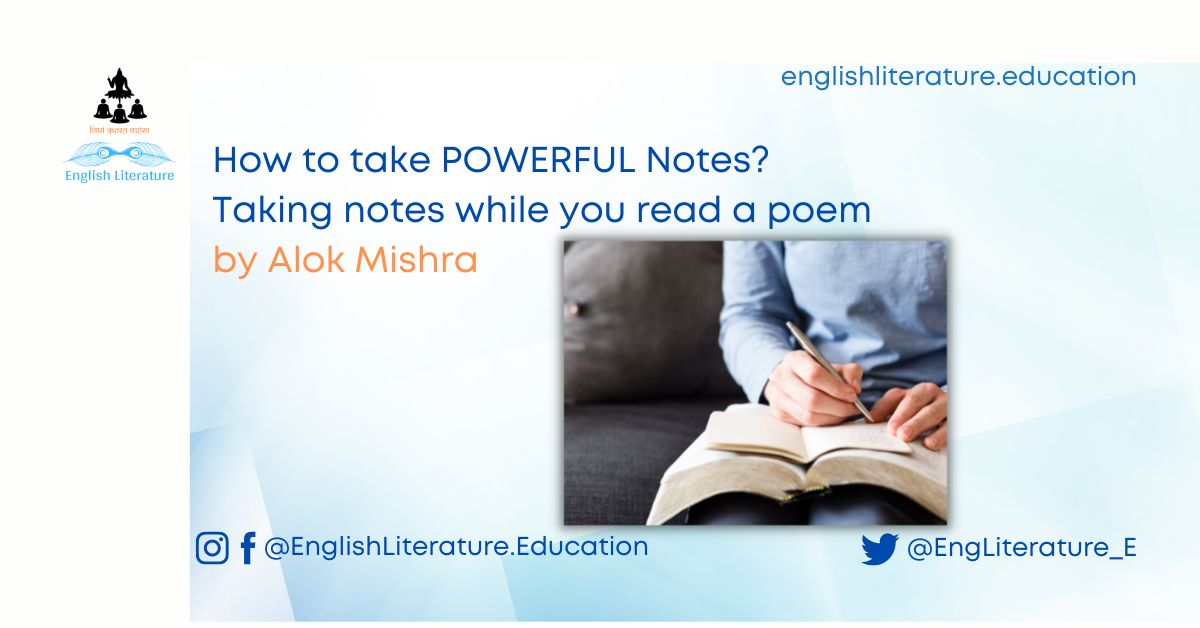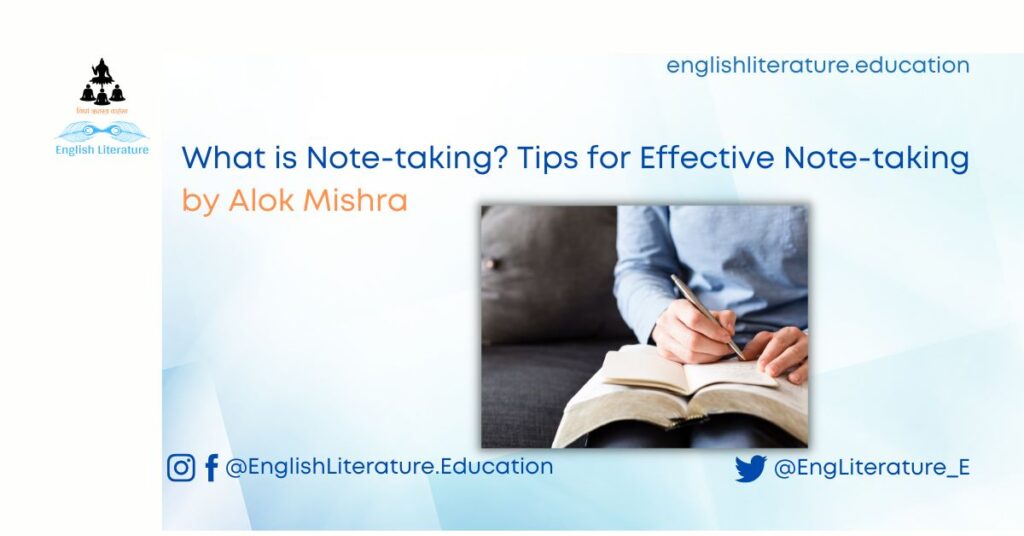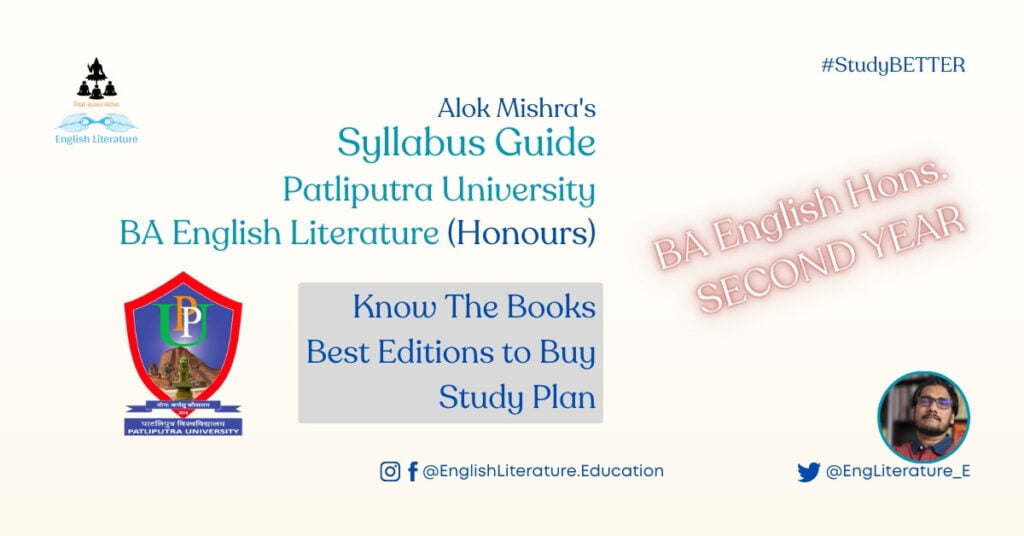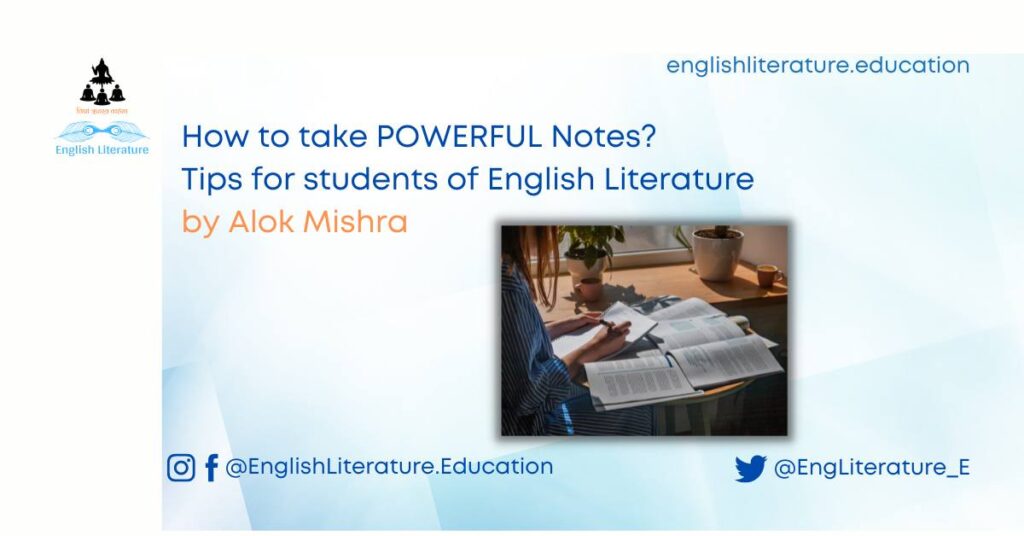At times, poems may pose a difficult challenge in front of students of literature, be it Hindi, English or literature in any language. Poets use the same language that a novelist or an essayist may use. However, the style of using the language is different. And this part makes poetry a little difficult to understand compared to novels or essays. By taking notes as you read a poem, you can make the poem simple to understand. However, effectively taking notes will be more helpful for the present reading as well as revisions in the future. Well-organised, with clarity, and comprehensive notes about a poem are helpful in many different ways. In this article, we will learn how to take notes as you try to interpret, understand and study a poem.
Taking Notes while reading poetry:
Reading a poem is an art. Some are masters in it. Others, at times, may find reading a poem challenging. And the difference, other than one’s prior experience, is often the methods of taking notes. Let’s focus now!
Metadata Notes: This note will be taken by collecting data about the poem, and reading the poem once.
- Title of the poem
- Publication date (or year)
- Who is the poet?
- The collection in which the poem appeared
- Collection publication date (or year)
- Poet’s date of birth (and death, if applicable), the age to which the poet belonged, and predominant poetry of the period (romantic, philosophical, war poetry, etc.)
- Number stanzas, segments, parts and lines in the poem (as applicable)
- Type of the poem – Ode, Elegy, Eulogy, etc.
- The rhyme scheme of the poem
- Names of a few other poets who shared the age with this poet
The metadata notes will help you posit the poet on the timeline of the history of English literature. It will also help interpret the poem if something requires a broader context. In addition, metadata will help you solve the objective questions in examinations like UGC NET.
Notes as you read the text:
Start by making these columns in your notebook. You should use a wide paper or an A4 paper in the landscape way.
- Figures of speech
- Symbols
- Characters
- Issues discussed
- Notes on the theme
- Overall view of the poem
In the figures of speech column, you will note down all the similes, metaphors, hyperboles, anaphoras, ironies, antitheses, ellipsis, and others as you find. You can put shortcuts at the end of every entry to readily identify them when in need – as cold as ice (S), I could see the Sun in his eyes (M), etc.
In the column of Symbols, you will put every instance of symbolism you may notice in the poem. Freshly blossomed roses – spring, happiness, hope, love; dark and gloomy evening – sadness, loss, decay, sorrows; doves flew over the fields – peace; and other symbols as you may find in the course of your reading.
In the column of characters, you should put all the characters appearing in the poem. Who is the narrator? Is there any other person? The mood of the narrator, appearance, vision, awareness, actions, and other details should be in this column. Example: A shepherd wearing a red shirt appears in the poem. He is happy, as the narrator describes, and singing a song.
In the column of issues discussed, note the issues the poem discusses. Examples: about a sunny day on the beach, staring at the stars in the night, fallen heroes of the world war, etc.
In the notes on the theme column, you should mention if the poet has any specific concerns about the issues discussed in the poem. Also, you can write your observations about the poem’s theme. For example, in John Donne’s Death be not proud, the poet seems to make fun of death, the ultimate force that humankind fears. What else can you find? Try it, and take notes.
In the final column, the overall view of the poem, you should note your observations about the poem (as a whole). How did you like the poem? Does the poem have some universal message? Is it a personal poem? Is the theme limited to a day, a year, or a person’s affairs, or is there some broader perspective? How is the poem’s lyrical quality? How does the poem compare with other poems on the same theme?
Benefits of impactful notes:
Believe me, once you do this as you read a poem, you will never need some supplements or someone else’s help. Try taking notes in this way when you read poems. You will notice the difference in your capacity to interpret, understand, and analyse a poem to its closest possible universally accepted form. For taking notes, you will obviously read the poem with minute attention. This is one extra advantage that you get. In doing so, you will probably remember some lines or the entire poem if the poem is short.
If you take notes from a few poems by any poet, you can collect these and write an article about the poetic prowess or the style and themes of poetry of that particular poet. That will be SOME thing! By having collective notes, you can easily understand the recurring themes, dominant issues, frequent styles, repeating rhyme schemes or lyrical styles, and many other things that a poet generally or frequently does. Try doing this with 5-6 poems by William Wordsworth and see what you can find.
All the best!
Read the next article: How to take notes as you read a novel?
Read the previous article: How to take notes? Tips for students of literature
By Alok Mishra





3 Comments. Leave new
This is exactly what I was looking for… studying a poem will make more sense now and I am sure I can keep notes for a long time. Thank you!
This is wonderful… it should help anyone who wants to study poem academically. Suitable and helpful for First year English literature students, BA.
This is very helpful… I read this article randomly after reading the article on the best books for history of English literature. Well, this one inspired me to read poems in a better way with notes on the go. Thanks for these tips. I am sure it will help any student of English literature.